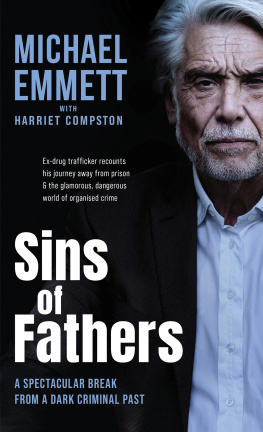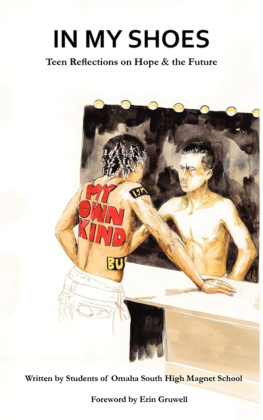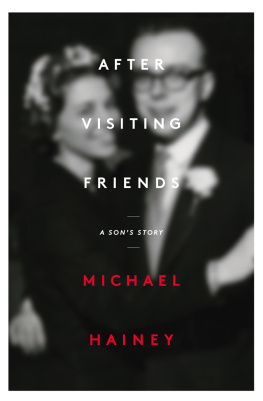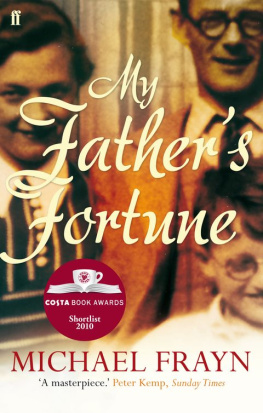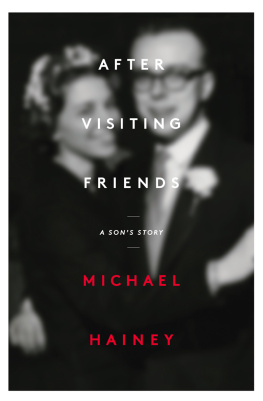Copyright 2005 by Michael Rips
All rights reserved
For information about permission to reproduce selections from this book, write to or to Permissions, Houghton Mifflin Harcourt Publishing Company, 3 Park Avenue, 19th Floor, New York, New York 10016.
www.hmhco.com
The Library of Congress has cataloged the print edition as follows:
Rips, Michael, date.
The face of a naked lady : an Omaha family mystery / Michael Rips.
p. cm.
ISBN 0-618-27352-2
1. Rips, Michael, 1954 2. Rips, Nie. 3. Fathers and sonsNebraskaOmahaBiography. 4. JewsNebraskaOmahaBiography. 5. Omaha (Neb.)Biography. I. Title.
CT 275. R 61155 A 3 2005
978.2'25403'092dc22 2004054052
e ISBN 978-0-547-97506-1
v2.0518
FOR NIC, NICK, AND NEILA
The Woman in the Basement
1.
A WOMAN set a coffee before me, and I thought of the first time that I saw a woman fly.
2.
A MONG quiet neighbors, we were the quietest. Father came home every day at the same time, greeted my mother, settled on the couch, and slept; occasionally he would sit in a chair. In either case he would sleep.
At six-thirty he would be called to dinner. After dinner he would return to the couch. Mother would sit next to him. When he finished reading, he would go to his room and sleep.
My father was the appreciative product of his own privileged life. Born in Nebraska, he was Republican, affluent, and content.
As to his relationship with my mother, I heard not a single argument between them. They were respectful and admiring.
3.
M OTHER was sitting on the steps in the hall. In front of her was a box of letters. She pointed to a room in the back. There in tandem on the bureau were his belongings. This was the purpose of my returnto remove what I cared to have. My father had died several years before, and Mother was moving.
But the objects in that room gave off no trace of my father. He fit so smoothly into the order of things, the circuitus spiritualis, that he had passed on nothing that was not more perfectly expressed by something nearby; if he had an emotion or thought that was individual to him, it lacked the power of emanation.
I gathered the few things of his and my own that I had decided to take back to New York. Needing a box, my wife, Sheila, and I went into the basement.
After a few minutes, I found a small container and then retraced my steps.
Sheila asked me about a black portfolio that had been slipped behind a cabinet. She pulled it out and laid it on the floor; the portfolio was held together with black ribbons.
An arm, a leg, a torso, another arm, a torso, a head came out of the portfolio. A naked black woman.
Sheets and sheets of a naked black woman, and below each the initials of my father.
On the other side of the basement wall was a small room used to develop black-and-white photographs. Scribbled on the wall of that room was this:
They do not sweat and whine about their condition,
They do not lie awake in the dark and weep for their sin,
They do not make me sick discussing their duty to God,
Not one is dissatisfied.... Whitman.
Mother was preparing dinner. For as long as I could remember my family had a cook. The ablest was Mary. But even the worst were capable of being taught, and my mother did a very good job of that. They were different from the meals I would get at our neighbors.
Claire was one of our neighbors and I enjoyed visiting her. One evening at Claires, we heard her brother, Ronald, singing Surrey with the Fringe on Top from the musical Oklahoma! That was unusual because Ronald had for years sat quietly in his room. I imagined that he was writing or composing or juggling and that one day I would hear that he had won a prize.
Claire went straight to his room. She wanted to share in his happiness.
What she saw was a happy Ronald lying on his back rotating a live chicken on his manliness, singing Chicks and ducks and geese better scurry when I take you out in the surrey....
We made our way back to Claires room. Minutes later Ronald passed the door.
He was upset.
Recounting her last minutes, he explained that in enjoying a chicken the greatest pleasure comes when the chickens neck is broken, causing a death shiver that Ronald found impossible to duplicatesuggesting that Ronald had only settled on chickens after experimenting with other animals.
Several days later, I found myself back at Claires. It was the late afternoon and Ronalds mother had returned to the house with a friend who was visiting Omaha from the East Coast. Claires mother invited me to join the family for dinner.
When Claire and I came to the table, everyone was there but Ronald. He was still in his room.
Claires mother brought out a delicious first course. Before we had finished it, Ronald arrived. His mood was good.
Having cleared the table, Claires mother returned from the kitchen with the tetrazzini. Then I saw it. Ronalds face rippled. There was only one conclusion: we were about to eat his lover.
As I reflected on this, the woman from the East Coast, who was sitting to my left, placed a good-sized portion of tetrazzini on her plate. Believing that one is obligated to warn ones dinner companion that she is about to consume a dish that has been inseminated by another guest at the table, I leaned toward the lady from the East Coast and whispered, The chicken was murdered.
There was no response.
With Ronalds lover now inside her mouth, I bent down, pretending to have dropped my napkin, and turning my head upwards from next to her knee, whispered, Theres semen in the chicken.
That did it.
In retrospect it has occurred to me that Id simply substituted an obvious observation with an obvious and repulsive observation, and the womans inability to finish her meal had less to do with the chicken than with me. Ronald had succeeded in making me more revolting than Ronald himself.
I would like to say that Ronald was now in the musical theater, but the truth is that I do not know what happened to Ronald.
We left Omaha on a Sunday. On the way to the airport, we passed the Civic Auditorium. It is where I saw the woman (Miss Rietta) fly.
4.
I N NEW YORK, I went back to sitting in a coffee shop on Ninth Avenue.
A blond woman approached my table. She was from the seminary. She was a friend of the Bearded Priest and asked me if Id seen him. She was concerned.
Before becoming the Bearded Priest, he had raised bird dogs and before that worked in a lumberyard. As an Episcopalian priest, he had lived among the spiritists of Haiti and now spent his time reading Emmanuel Levinas and fishing off a pier on Fourteenth Street. I had taken note of him because of his resemblance to Whitman and because of Levinas.
A Lithuanian few who had moved to Germany in the late 1920s, Levinas attended Husserls last semester of teaching and Heideggers first. Levinass translation of Husserls Cartesian Meditations brought phenomenology to the French and specifically to Sartre. During the war, Levinas was taken prisoner by the Germans and placed in a concentration camp.
Levinas survived the war. His family did not. It was at this time that Levinas was introduced to the Talmud, and it was to the Talmud that he devoted much of his writing.
I told the woman that Id not seen the Bearded Priest.
She sat down. She was attractively built, her face was a deep pale, her eyes soft and alarmed. We began to speak. She told me that she had been brought to the priesthood by accident, a chance reading of the story of Saul.
My father had told me this story.
He was not known for talking. Even to his sons he spoke little. But this story he had told me, this story among a handful of others, randomly offered and separated by long stretches of time. Some of these stories I remembered, some I did not. Some of my father I remembered; some I did not.




